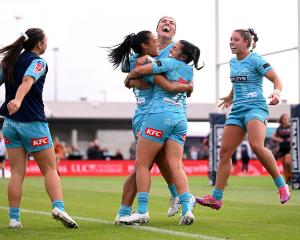He's the trainer, the man given the tough job of whipping 28 young professional athletes into the best possible shape.
And whip he does. Dallow pulls no punches, has a voice that lets the players know exactly what is expected of them and squeezes every ounce of conditioning out of the players in the limited time he has to work with them.
"There is a bit of hate. If they didn't hate me sometimes, I wouldn't be doing my job,'' Dallow said.
"It's not my problem. I don't care if they like me or not. I'm not here to be their friend. If every one of them hated me, I'd probably be doing my job really well.
"There is no time to clown around at this level. And I'm probably a fairly intense person anyway. I'm a firm believer that the way you train is the way you play.''
Dallow is in his first season with the Highlanders after working with Otago at the end of last year.
His is a fascinating story of a promising athlete and rugby player who has spent most of the last 15 years in the United States but has found time to represent New Zealand at two Winter Olympics.
Dallow - the younger brother of television newsreader Simon - was a star rugby prospect on the wing 20 years ago but athletics was his first love. He dreamed of winning an Olympic medal in the decathlon, and earned a scholarship to the University of Arizona.
He had instant success, winning All-American honours and the decathlon championship in the powerful Pac-10 conference, but made the rash decision to play a game of rugby at the end of his sophomore year and copped a freak hit that tore his knee apart.
A long period of rehabilitation followed and Dallow discovered he had lost his ability to jump. He finished his schooling at Arizona, graduating with honours in finance, and helped coach other athletes.
He later took a coaching job at Northern Arizona University, getting back into rugby and playing so well he represented the United States in sevens and was offered a professional contract with English club Saracens.
"Then I blew my knee again and that was it for my rugby career".
This is where Dallow's sporting career gets really interesting. He met the pilot of the New Zealand bobsleigh team, Alan Henderson, and was sounded out about a career on the ice.
He tried the sport for the first time in 2000 and within two years he was a Winter Olympian.
From rugby and decathlon to bobsledding might seem like a leap but Dallow said he adapted quickly to the sport.
"My grounding in physical training has all been power-related, and bobsleigh is all about power.
"It's not that big a stretch going from something like throwing the discus to bobsleigh.
"I remember the first time I did look around me and wonder what I was doing. But you just run and hopefully you get in.''
The New Zealand team was ranked about 20th in the world, making it more than just a novelty act like the Jamaican team in Cool Runnings.
Dallow's injury curse struck again. He broke his leg three weeks before the Games in Salt Lake City in 2002, where he was a reserve for the four-man team, and tore part of his Achilles tendon a month before the Turin Games in 2006, where he competed in the two-man.
Dallow has kept an interest in the sport and is helping a group of young athletes train with an eye on the next Winter Olympics, and is also planning a talent-identification camp in Dunedin.
His love of coaching and training grew after his first major injury and subsequent conditioning roles he held at the two colleges.
From 2003 to 2007, he coached and trained a rugby team in Phoenix before hearing about the Highlanders job from fellow bobsledder and Dunedin sports scientist Angus Ross.
Initial doubts about Dunedin - he went from 40degC heat in Phoenix to ice on the roads in July - dissipated and he now enjoys living in a smaller city.
His job covers all aspects of strength and conditioning, and he is extremely hands-on with the Highlanders through their intensive season.
"I think I do things a little differently. Years of training with a lot of different coaches has given me a lot of insight into how to use more than one method of training.
"I've picked up a lot of different techniques and I have been able to pick and choose what I think works best.''
Dallow has found it frustrating to have such a limited amount of time with the players, who are available only for about three weeks before Christmas and less than a month in the new year.
"We don't get anywhere near enough time to prepare them. We get a little window to prepare these guys for a long season. Most sports, you get a more compact season and the rest of the year to prepare.
"Maybe one day it will change. We'd prefer to have a two or three-month off-season.''
At this stage of the season, Dallow has to juggle the need to maintain conditioning, the feelings of the players, who might be spent from a tough game, and the demands of the coaches.
He deals with some players who want to rest, rather than work on their conditioning, because then they will feel fresher on game day. But he points out that might mean the player will only last 40min in the game - "You have to feel bad sometimes".
Dallow has been reasonably happy with the levels of conditioning in the squad.
He runs a varied programme, with the workload on players heavier some weeks than others.
Most weeks, the players have a strength workout, a power workout and a speed workout, as well as a conditioning session to augment the normal team trainings and unit trainings.












